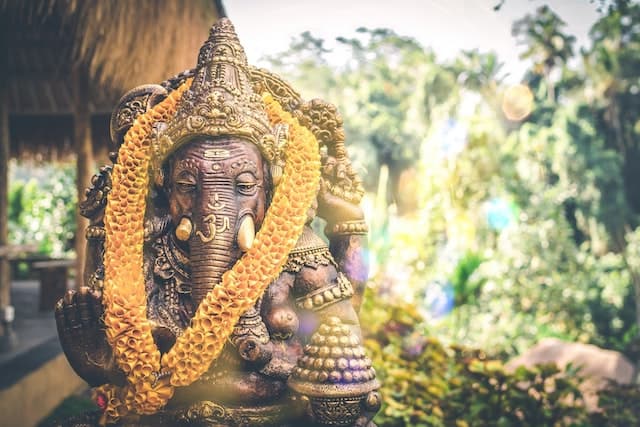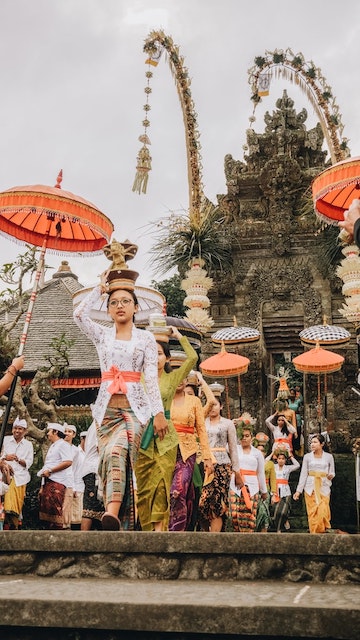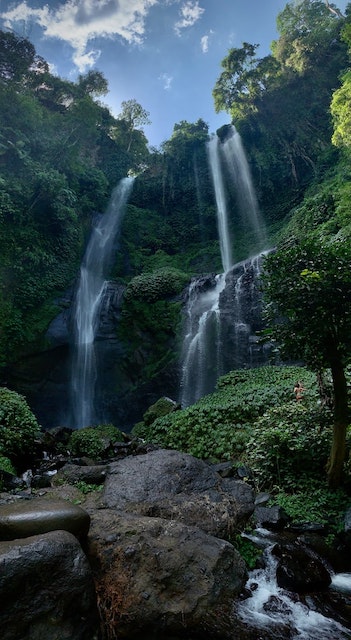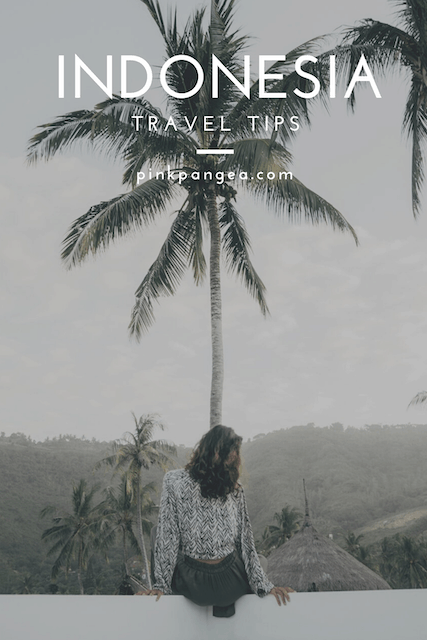Indonesia Travel Tips: Anna’s Take on Health, Safety & Romance

Traveling to Indonesia? Anna Cabe gives you Indonesia travel tips about health, romance, women’s rights and safety:
Indonesia Travel Tips: Health
Feminine Hygienic Products in Indonesia: What’s available/what’s legal/where to buy them?
It’s difficult but not impossible to find tampons in larger cities. Check out pharmacy chains like Guardian and Century. The boxes (Playtex usually in my experience) are small and a bit pricey, though. I generally pay Rp30.000 to Rp50.000 for eight tampons in Palembang, about $3 to $5 and I’ve heard that the prices are higher for the same number in other cities.
Otherwise, though, if you’re not in a big city, pads and pantyliners can be found everywhere–convenience stores, pharmacies, groceries, and supermarkets, and are very cheap, like a couple of dollars for a dozen or more.

Birth Control in Indonesia: What’s available/what’s legal/where to buy them?
Condoms are available everywhere–supermarkets, convenience stores, and the like (there are even durian-flavored ones if you’re feeling adventurous).
I’ve heard, through expat forums, that birth control pills are available, even over-the-counter, in pharmacies, but I wouldn’t bet on it, especially for unmarried women. It’s probably best to bring a large supply if you’re on the pill.
Gynecologists in Indonesia: Are there any that you recommend? How, if at all, is a visit different from at home?
I’ve never been to one here, so I wouldn’t know, although health care as a whole varies widely. Doctors tend to prescribe a lot of medicine, maybe a bit unnecessarily, in my opinion. You should be very quickly aware of what is considered a “good hospital” or “good clinic” wherever you go in Indonesia. It is very cheap, though, to go to the hospital or clinic. In fact, I’ve never paid over twenty dollars for anything, even getting stitches and antibiotics at one visit.
Breastfeeding in Indonesia: What are accepted places for women to breastfeed? Is it accepted to do so in public?
I wouldn’t breastfeed in public necessarily. But if you’re in the company of only women, women are pretty relaxed about breastfeeding in front of each other.

Indonesia Travel Tips: Romance
Dating Locals in Indonesia: What are the norms and traditions? What should women look out for?
I’ve known of a quite a few mixed Indonesian-foreign, and even mixed-religion couples, and interestingly, it’s fairly evenly split between foreign woman-Indonesian man and foreign man-Indonesian woman.
Dating in general is fairly circumscribed, at least in my city. While couples aren’t necessarily chaperoned every time they go out and Palembang isn’t as conservative as other areas, Palembang is still fairly sexually conservative. I’m careful around my male friends (I try not to be alone with them), so our relationship isn’t misconstrued. And, as a woman of Asian descent, I have gotten a few strange looks while out alone with my white American male friends.
There is an icky history of somewhat exploitative white man-Asian woman relationships throughout Asia (basically, prostitution and the like), so your race and the race of your male friends and boyfriends can definitely impact how other people view and treat you.
That being said, it’s totally possible to date locals, as long as you keep more conservative local customs in mind. And dating in general is probably easier in more urban areas, especially foreigner-heavy cities like Jogjakarta, Bali, and Jakarta.

Men in Indonesia.
I don’t really think it’s possible to “type” men here. Do I feel like men-women relations are different? Yes, definitely more conservative and constrained overall. Is Indonesia more patriarchal? Yeah, I’d say overall, although some ethnic groups like the Minangkabau are matrilineal. Women and men don’t hug, for instance.
Also, it may be the language barrier, but while I can’t say the harassment is any worse than I’ve experienced in other countries (but then I’m Filipino-American and my white friends definitely get way more attention), I do get into very awkward conversations with men who are clearly trying to flirt with me. Still, it’s so very stilted and limited to them telling me how pretty I am.
Otherwise, the men are all pretty varied, even if seen through the prism of Indonesian culture and a more overt religiosity. Some like sports; some like movies. Some are shy; some are social. Some know a lot of English and about the West, others don’t. If I rack my head for types, I come up short.
Is Indonesia LGBTQ-friendly?
In urban areas, maybe, but LGBT issues aren’t really out in the open. I don’t know of any people who are truly “out” and are in relationships. There are trans people and queer people here, but it’s not necessarily easy for them. I’ve read about activism and other pushes for more acceptance (including a nursing home for trans people!), but it’s not really “safe” to be out in many places.
Indonesia Travel Tips: Women’s Place in Society
Women’s Rights in Indonesia: Do women have the same position in society as men? How can you tell?
This one’s complicated. Indonesia is, in many places, pretty patriarchal. While it can get sticky discussing Islam, women do cover up in ways and behave in ways that men don’t have to. Some of it — mainly the modest dress and sitting behind men in the mosque — can be attributed to religious custom. Other norms seem to be more local, like women — not just Muslim women but Christian and other types of religious women— typically don’t go out very late in my city or even go out that much alone while men gallivant all over and at all times.
On the flip side, this depends a lot on where you are. Even though, compared to my male friends, I couldn’t go out that late or alone, I went out a lot later and more frequently than my female friends in more rural areas.
And, I met tons of women throughout my time here who were all very different. Most of my friends were university-educated, working, and quite independent. Quite a few of them went out late, drank, smoked, had boyfriends, and argued with their (many) male friends.
Other women I met were quieter and more conservative, and more family-focused, but they too held university degrees and full-time jobs.
Then, there were women like my ex-host-mother who wore a hijab, was a devout Muslim, studied Arabic, ran multiple independent businesses, and was seen as a leader in her neighborhood, and whom, many, including men, deferred to.
And, most of my female students, even if they were amazed that I liked to go out by myself, ride ojeks (motorcycle taxis) and travel independently, generally expected that they would enter university and have careers.
So, I met a mixed bag of women in Indonesia. Indonesia’s not a feminist utopia, but then I’m not sure one exists. It’s a rapidly changing society that differs wildly from place to place. If you visit, I’d err on the side of conservatism, especially outside foreigner-heavy spots like Bali, Jogjakarta, and Jakarta, but the country may surprise you.
Indonesia Travel Tips: Anna’s Take on Health, Safety & Romance.
Local Women in Indonesia: What are some clear cultural differences between you and them?
Indonesia is insanely communal and religious, so as an introvert and someone who’s mildly religious at best, I definitely stood out.
People still have a difficult time understanding why I like to eat and drink coffee and go to movies alone. Depending on which group of women I was with, my style of dress and behavior could definitely stand out. At work, I was always getting gently reprimanded for my dress (either too tight or too short or revealing skin I wasn’t supposed to — even if I thought I was decent enough in long sleeves and long pants or a skirt) and people were shocked by my loud, somewhat clumsy mien and my habit of wearing pants and running off on motorcycle taxis. I was called a tomboy a lot.
But then, the other women in work could get pretty loud (Palembangers are loud people in general; a lot of conversations sound like screaming. This is normal). Everyone drives a motorbike, including middle-aged and elderly housewives (it was just weird that I went off on motorcycle taxis alone all the time). And, with my younger, university friends, I fit in just fine.
Women-Specific Environments in Indonesia: Are there places where only women are or are not allowed?
Mosques are separated inside by gender, and I know for some special feasts, if a woman had her period, she didn’t go to the mosque with the others.
I was also cautioned about entering spaces, like certain warungs or activities, that were primarily frequented by men for safety reasons. I made the mistake of going into such a warung on my street, and now the men feel free to catcall me all the time whenever I pass. They haven’t tried anything, but it does make the simple act of walking down my street aggravating.
There are a few gender-segregated schools, though I have no personal experience with them. Public education is generally co-educational, though some classrooms are pretty separated down the line by gender. For example, it can get awkward if boys work with girls, though my schools haven’t been like that, beyond adolescent awkwardness.
There are many spas and salons that are catered only to women, which are wonderful. And generally, people do socialize within their genders, so I spent a lot of time in traditional markets, the pasar, where women definitely reign (even if men are there). I learned to bargain from the female teachers at my school!
Indonesia Travel Tips: Anna’s Take on Health, Safety & Romance.
Perception of Foreign Women in Indonesia: How do local men/women react to you when you say where you’re from?
Well, I’m not white and am of Southeast Asian descent, so I get a lot of disbelieving reactions when I tell people I’m American. Some people get it eventually; some never do. I had a taxi driver once say to my face that he didn’t believe me, and I gave him the cold shoulder after that. For foreign women of color, it’s up to you on how you manage it; I am less patient than I was last year. Now I shortly say, “I was born in America but my parents immigrated from the Philippines.” If it’s a student or a polite curious person or friend, I may explain more, but for people who push it, I refuse to engage.
American women are generally seen as being freer, more tomboyish, and often, more promiscuous; that is mostly from movies, music, and TV, I suspect. How this shows in the treatment of foreign women varies; some people are pretty forgiving of my foibles as a result. I do get corrected in my behavior quite a bit, though, mainly for not being aware of my safety or local customs or such.
Something you may also find frustrating, depending on why you’re in Indonesia, is people’s attempts to make you safer, as a woman. By this, I mean, people may caution you or downright tell you not to go outside at night, not to walk alone, not to go here and there, and may even try to be the only ones to take you anywhere so you won’t be in danger. Don’t worry; it’s totally possible to have a fairly independent life. I managed it, but you have to be careful and polite in how you get people to understand that you’ll be fine.
Indonesia Travel Tips: Safety
Transportation in Indonesia: Any that are safer/less safe for women to take?
I’ve always been told to be wary of buses and angkots. Women definitely use them, but I’ve been told not to go on them alone, and with angkots (mini-vans), you definitely need to learn the routes, which can be tricky to do since they’re marked by the color of the vans, and information on routes is difficult to attain. I’ve never ridden them alone.
I primarily use ojeks, taxis, and becaks. Bluebird is a reputable taxi company and is based in most major cities. If it’s not a taxi company like that, stick to ones with meters. Or, bargain in advance for the price. I’ve never had a problem with taxis, but definitely be aware of where you’re going. Ojeks, motorcycle taxis, are hit or miss, and you should have a helmet if you plan on using them with any regularity. As a rule, I never used ojeks after dark and tried to stick to guys who I knew were good, safe drivers. Becaks, carts pulled by motorcycle or bicycle, tend to be fine, but it can be a little nerve-wracking being in that little cart on a busy road. I only used them for short distances that were just a little too long to walk.

Dangerous area/s in Indonesia: Any specifically for women?
Certain areas of Indonesia (Aceh, Papua, Central Sulawesi, East Kalimantan) have or had a lot of upheaval, and I’ve been warned to stay away from them due to ethnic conflict, religious fundamentalism and the like. In Aceh’s case, it has an international reputation due to it being under sharia law and being strict on women as a result. But, I’ve known a number of Western women who’ve ventured into Aceh and Papua, and have been fine. I’d say exercise caution, check any US State Department advisory, and try to get on-the-ground reports.
Clothing in Indonesia: What to wear/what not to wear?
Outside foreigner-heavy areas like Jogjakarta, Bali, and Jakarta, I’d go for modest clothing. Except in mosques, I’ve never been asked to cover my head, but as a rule, keep to longer pants and skirts (at least to the knee), and shirts with sleeves and higher necklines (no cleavage). Then take your cues from the people around you.
In my city, I’d be confused by seeing women in short dresses, skirts, and shorts and sleeveless blouses and dresses, but I found out later these were mostly Chinese-Indonesians and/or Christians. Since I worked in a majority-Muslim school at first and lived in a Muslim area, I erred on the conservative side. I now work in a school owned by Chinese Christians so there, I dress a bit more casually but also work in a mostly Muslim middle school so I dress more conservatively and formally there.








